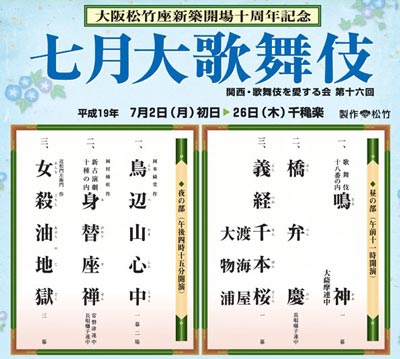| JULY 2007 |
|
2 shows in T˘ky˘ (Kabukiza, National Theatre), 2 in ďsaka (Sh˘chikuza) and 2 tours (Eastern Provinces, Central Provinces)!
|
| Kabukiza (T˘ky˘) |  |
| Dates | 7 ~ 29 July 2007 (Shichigatsu ďkabuki) |
| Program |
Ninagawa Jűniya |
| Casting |
Onoe Kikugor˘, Nakamura Tokiz˘, Ichikawa Sadanji, Ichikawa Danshir˘, Onoe Kikunosuke, Nakamura Kanjaku, Nakamura Kinnosuke, Ichikawa Kamejir˘, Ichikawa Danz˘, Kawarasaki Gonjűr˘, Band˘ Shűch˘, Band˘ Kamesabur˘, Onoe Matsuya |
| Comments |
"If music be the food of love, play on!". The trouble caused by love is the theme of Shakespeareĺs play, a comedy with great depth. July at Kabukiza features an encore performance of a bold experiment. Ninagawa Yukio, known throughout the world for productions of Shakespeare and his blending of traditional and modern theatrical techniques will direct Kabuki actors in an adaptation of Shakespeareĺs "Twelfth Night". After being shipwrecked and being separated (presumably forever) from her twin brother Sebastian, Viola dresses as a young man, calls herself Cesario and takes service with Orsino, who is in love with the fabulously wealthy Olivia. In the guise of Cesario, Viola becomes Orsinoĺs messenger to Olivia, but she does not love him. Instead, she falls in love with Cesario and in turn, Viola falls in love with Orsino. But while these characters suffer for love, others lust after Oliviaĺs wealth. Her uncle Toby cannot stand to see the money leave the family and tries to get her married to the obnoxious Andrew. Meanwhile, Oliviaĺs steward Malvolio is also in love with her, but he is so stuck-up and out of date that the people around him plot to make him think that Olivia returns his love, only making him seem more ridiculous than ever. In Julyĺs production, all of Shakespeareĺs characters will take on a new, Kabuki incarnation. Viola will become Princess Biwa (a biwa is a Japanese lute), and disguised as a man, she will take the name Shishimaru, sounding like a proper samurai, and all the other characters get new Japanese names as well. Ninagawa Yukio is famous throughout the world for his direction of new plays and the classics, using modern theatrical techniques and traditional aesthetics with a bold visual touch. For example, his production of "Macbeth" brought the play into the world of Japan and transformed the stage into a giant Buddhist altar, with mysterious old women praying throughout the play, as though the story of Macbeth took place within the altar as a message from the land of the dead. His production of "King Lear" brought together a famous English actor as Lear and a popular Japanese actor as the fool and was performed in England, while his production of "Oedipus Rex" combined an actress from the Japanese modern theater with an actor from Ky˘gen, the traditional comic style, and the production even went to Greece. The new production of "Ninagawa Jűniya", which was in fact premiered in July 2005 at the Kabukiza, will star Onoe Kikunosuke as Biwa and her twin brother Shuzennosuke, while Onoe Kikugor˘ will play Maruo B˘dayű and the jester Sutesuke. Also featuring Ichikawa Sadanji, Ichikawa Danshir˘ and Nakamura Tokiz˘. Donĺt miss this exciting new Kabuki experiment! Source: Earphone Guide website |
| Sh˘chikuza (ďsaka) |
| Dates | 2 ~ 26 July 2007 (Shichigatsu ďkabuki) |
| MatinÚe |
|
| Evening | |
| Casting |
Kataoka Nizaemon, Ichikawa Ebiz˘, Kataoka Takatar˘, Kataoka Ainosuke, Kataoka Hidetar˘, Band˘ Takesabur˘, Nakamura Karoku, Nakamura Kazutar˘ |
| Comments |
|
 |
|
| National Theatre (T˘ky˘) |
| Dates | 3 ~ 24 July 2007 (Shichigatsu Kabuki Kansh˘ Ky˘shitsu) |
| Program |
Kabuki no Mikata |
| Casting | |
| Comments |
Educational program at the National Theatre called Kabuki Kansh˘ Ky˘shitu ("Kabuki Appreciation Class"). This is a very interesting formula for the beginners because there is lively presentation of Kabuki (or some aspects of the art like music, stage tricks or fighting scenes) on stage, followed by the drama "Nozaki-mura": A farm girl Omitsu (Nakamura Fukusuke) is busy planning her marriage to Hisamatsu (Nakamura Matsue) who has just returned to the country after leaving his post in the city in disgrace. Suddenly Osome (???) appears. She is the daughter of the rich merchant Hisamatsu served and their love affair was the cause of his disgrace. Despite the best efforts of Hisamatsu's father Kyűsaku (Nakamura T˘z˘), the course of true love cannot be changed. Omitsu decides to sacrifice her own love and to become a nun to save the young couple who would rather die than be separated. All four of the main actors are Living National Treasures and this act shows mature Kabuki acting at its finest. |
| Kabuki Tour in the Central Provinces | |
| Dates | 1 ~ 31 July 2007 |
| Program |
Kabuki no Mikata |
| Casting |
Ichikawa Ukon, Ichikawa Danjir˘, Ichikawa Monnosuke, Ichikawa Emisabur˘, Ichikawa Emiya, Ichikawa En'ya, Ichikawa Shun'en |
| Comments |
|
| Kabuki Tour in the Eastern Provinces | |
| Dates | 30 June ~ 31 July 2007 |
| Program | |
| Casting |
Nakamura Kichiemon, Nakamura Shibajaku, Ichikawa Somegor˘, Nakamura Kash˘, Ichikawa Komaz˘, Nakamura Kichinosuke |
| Comments |
|
|
|
| Contact | Main | Top | Updates | Actors | Plays | Playwrights | Programs | Links | FAQ | Glossary | Chronology | Illustrations | Prints | Characters | Derivatives | Theaters | Coming soon | News |